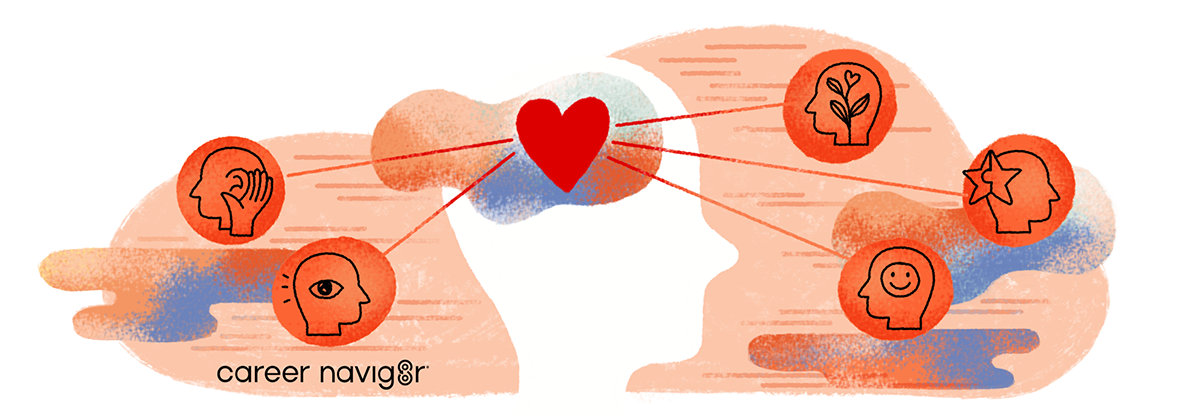5 Ways To Improve Emotional Intelligence as a Mentor

One of the best ways to level-up in life is to improve your emotional intelligence. No matter your age, no matter your situation, emotional intelligence is a skill you never stop working on. There are always new ways to relate to people and approaches to being a more understanding and accepting person.
At Career Navig8r, one of the reasons we’re so proud to empower mentorship is because we feel that it’s an amazing way for people to improve their emotional intelligence. That’s why we’ve put together this list of five ways that we feel being a Mentor can improve your emotional intelligence and why Mentoring might be perfect for you.
1. Improve Your Self-Awareness
If you’re looking to improve your emotional intelligence, then self-awareness is one of the most valuable virtues you can hold. In many ways, maturity is all about improving your self-awareness and learning to see yourself through the eyes of others, and what better way to do that than to step into the role of a teacher.
A teacher – or in this case, a Mentor – is always at their most effective when they’re able to connect with their student. Teaching really is about putting yourself into someone else’s shoes so that you can find the best way to explain something to them. The more you teach, the more you’ll be training those empathy muscles and, before you know it, you’ll find yourself becoming a more mindful person across the board.
2. Practise Active Listening
Active listening is a vitally important social skill but the reality is that it’s far harder in some environments than in others. For example, if you’re sitting in a lecture then active listening can be quite easy – nobody expects you to respond to what’s being said, so you can simply focus on what the speaker is saying.
Active listening in a conversation is a whole other matter. When people are discussing ideas they’re passionate about it can be very easy to become more focused on telling than listening. This can lead conversations off track and make it hard to focus on clear results.
In a mentoring environment, the Mentor has a certain responsibility both to keep things on track but also to hear what their Mentee has to say. It’s a unique challenge and one that will push you to improve your active listening skills in a first-hand, practical setting.
3. Cultivate Patience and Understanding in Mentoring Relationships

As you get further into your role, it can be easy to lose track of how it felt to be new and forget that much of what seems obvious to you now, wasn’t always so apparent. Working with a Mentee can really help to give you a perspective on how far you’ve come and encourage you to develop a level of patience for those who are just starting out.
4. Provide Constructive Feedback with Sensitivity
When talking about feedback, people often address the challenge of how to take constructive feedback in the right way but they don’t often talk about how difficult it can be to give useful, constructive feedback. How can you isolate your opinions and biases and provide comments that will guide the Mentee towards finding their own path?
There’s no one solution to this and while there are useful principles you can follow, the truth is that giving good feedback is just another skill you’ll need to practise along the way. Who better to practise that skill with than a person who’s taking the same journey you yourself once took?
5. Demonstrate Emotional Intelligence in Mentoring Interactions
Last, but not least, it’s worth noting that the challenge of leading by example often encourages us to excel. As a Mentor, the likelihood is that your Mentee will be younger than you and, while it’s possible they’re starting a second career, they’re probably pushing towards the most senior role they’ve ever had.
All this to say that it’s reasonable to assume that while they’ll probably have a fair amount of emotional intelligence, it also probably won’t be as developed as yours. If that’s the case, then the most important thing you can do is to inspire them.
You have the chance to show them how patience, kindness, and understanding are successful tools in working with others. You can help them understand how people behave in common workplace settings and the ways to inspire confidence in those around you.
The best thing about improving your emotional intelligence is that the more you do it, the more it lifts up those around you, making the whole world a happier place.
Are you ready to start an incredible journey of self-discovery? Do you want to share your knowledge and experience with a fresh-faced up-and-comer? If so, then sign up to Career Navig8r today and become the Mentor you always dreamed of having!


